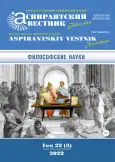Anxious expectations of students for distance learning: assessment in a philosophical context
- Authors: Borisova T.V.1, Izmailov E.P.2, Golubeva N.D.1
-
Affiliations:
- Samara State Technical University
- Samara State Medical University
- Issue: Vol 22, No 3 (2022)
- Pages: 22-26
- Section: Philosophical sciences
- URL: https://journal-vniispk.ru/2410-3764/article/view/109406
- DOI: https://doi.org/10.55531/2072-2354.2022.22.3.22-26
- ID: 109406
Cite item
Full Text
Abstract
Aim – to consider the phenomenon of anxious expectations that arises in students in the process of distance learning.
Material and methods. The anxious expectations were assessed using a specially adapted questionnaire of the Hospital Anxiety and Depression Scale (HADS). The students of SamSTU from grades 1 and 2, aged 18 to 22 years, took part in the survey (n = 162).
Results. The study revealed that the distance learning process contained latent component of anxiety of both existential and technical nature. With distance learning, 22% of students noted a decrease in the assimilation of educational material by an average of 15%. 75.92% of students were completely satisfied with the knowledge gained, 19.75% – not completely satisfied, and 4.32% – not satisfied.
Full Text
##article.viewOnOriginalSite##About the authors
Tatyana V. Borisova
Samara State Technical University
Author for correspondence.
Email: borisovatva@yandex.ru
ORCID iD: 0000-0003-0102-4250
PhD, Professor of the Department of Philosophy and social and humanitarian sciences
Russian Federation, SamaraEvgenii P. Izmailov
Samara State Medical University
Email: e.p.izmajlov@samsmu.ru
ORCID iD: 0000-0003-4948-6323
PhD, Professor of the Department of Anesthesiology, resuscitation and emergency medical services of the Institute of Postgraduate Education
Russian Federation, SamaraN. D. Golubeva
Samara State Technical University
Email: dinatalia2012@yandex.ru
ORCID iD: 0000-0001-6554-8550
PhD, Associate professor of the Department of Higher mathematics
Russian Federation, SamaraReferences
- Voiskunsky AE. Metaphors of the Internet. Voprosy filosofii. 2001;11:64-79. (In Russ.). [Войскунский А.Е. Метафоры Интернета. Вопросы философии. 2001;11:64-79].
- Verbickii AA. Digital learning: problems. Risks and prospects. Homo Cyberus. 2019;1(6). (In Russ.). [Вербицкий А.А. Цифровое обучение: проблемы. Риски и перспективы. Homo Cyberus. 2019;1(6)]. Available at: http://journai.homocyberus/Verbitskiy_AA_I_2019
- Solov'eva SL. Anxiety and uneasiness: theory and practice. Medicinskaya psihologiya v Rossii. 2012;6(17). (In Russ.). [Соловьeва С.Л. Тревога и тревожность: теория и практика. Medicinskaya psihologiya v Rossii. 2012;6(17)]. Available at: http://mprj.ru/archiv_global/2012_6_17/nomer/nomer14.php
- Kierkegaard S. The concept of fear. In: Fear and awe. M., 1995. (In Russ.). [Кьеркегор С. Понятие страха. В кн.: Страх и трепет. М., 1995].
- Nikitin AP. Socialism and the future of higher education. In: Fourth Lemov Readings. Samarа, 2018:267-269. (In Russ.). [Никитин А.П. Социализм и будущее высшего образования. В кн.: Четвертые Лемовские чтения. Самара, 2018:267-269].
- Neuropsychological tests and scales. M., 2017. (In Russ.). [Нейропсихологические тесты и шкалы. М., 2017].
- Izmailov EP, Golubeva ND, Klimova ES. Evaluation of the degree of assimilation of educational material by students in the course of mathematics in distance learning. Izvestia of Samara Scientific Center of the Russian Academy of Sciences. 2020;22(74):34-40. (In Russ.). [Измайлов Е.П., Голубева Н.Д., Климова Е.С. Оценка степени усвоения учебного материала студентами на курсе математики при дистанционном обучении. Известия Самарского научного центра РАН. 2020;22(74):34-40].
- Harchenko MA. Correlation analysis. Voronezh, 2008. (In Russ.). [Харченко М.А. Корреляционный анализ. Воронеж, 2008].
Supplementary files






